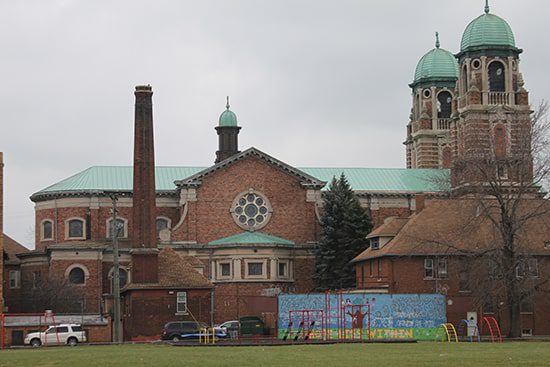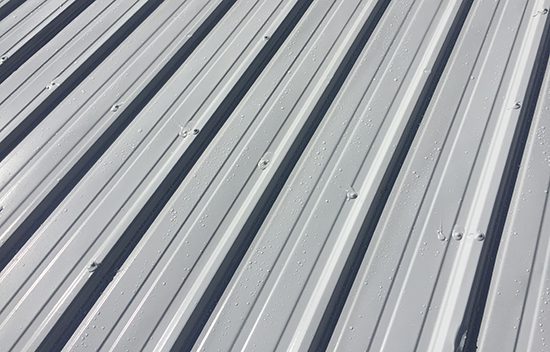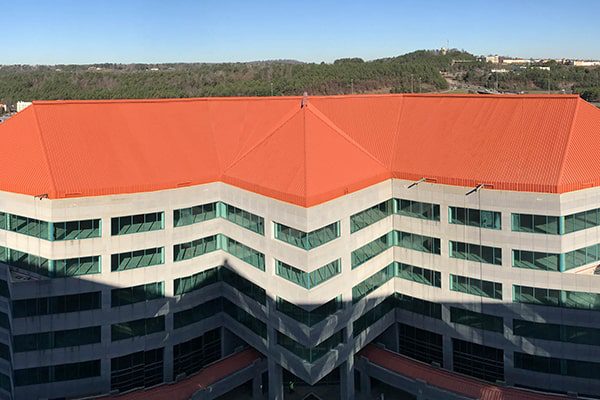Summary: Do you have a metal roof? Are you thinking of installing a silicone roof coating system, but you’re worried about thermal movement? In this article, we talk about silicone coatings, thermal movements, and if it’s beneficial to install these coating systems over a metal roof.
So, you have a metal roof, and you have some leaking.
But you’re trying to think of a more cost-effective solution than ripping the entire roof off.
You’ve done some research on silicone roof coatings and determined that they:
- Can be installed over an existing metal roof – minimizing tear-off.
- Can fill all the tiny holes and cracks that are allowing water in the insulation.
- Leave behind a seamless membrane.
- Can get your metal roof under a new 10, 15, or 20-year warranty.

But what about thermal movement?
If the metal roof contracts and expands, will this crack the coating and allow water into the system?
In today’s article, we’ll explain:
- Thermal movements on a metal roof and what kind of problems they can cause.
- Silicone roof coatings and how they react to thermal movements.
- Tensile strength and elongation and how they relate to thermal movement.
- Is silicone the only type of elastomeric coating?
Before we begin, West Roofing Systems has been a commercial roofing contractor since 1979. We specialize in spray foam roofing, which uses silicone roof coatings to protect a spray foam roof.
Since 2007, we began using silicone on its own as a way to restore a commercial roof.
If you’d like to see a case study of a metal roof that we’ve restored using a silicone coating, you can view that in the link above.
Now, let’s get into metal roofs, thermal movements, and silicone roof coatings.

Thermal movement of a metal roof
Thermal movement is when the metal roof expands when it’s hot and contracts when it’s cold. This presents a challenge for roof coating systems because if they cannot adjust to the movements, then the coating will crack, become separated, or some type of lost adhesion will take place.
This would result in water having easy access to the insulation below. Once the insulation becomes too saturated, water will enter your building.
This is why you need to make sure you choose an elastomeric coating if you’re going to install a coating system over a metal roof.
Silicone roof coatings and how they combat thermal movements
Silicone roof coatings are what’s called “Elastomeric”.
Elastomeric, according to thefreedoctionary.com, means:
“any material, such as natural or synthetic rubber, that’s able to resume its original shape when a deforming force is removed.”
What does this mean for elastomeric coatings on metal roofs?
Let’s say it’s a comfortable 70 degrees on a roof.
Later in the day, it gets to 95 degrees.
When it gets to 95, the metal roof will expand.
The deforming force = the sun’s heat.
Now it’s 8 pm, 70 degrees out, and the roof has contracted back to its original shape.
Since the deforming force is removed, and the roof coating is elastomeric, the coating will return to its original shape as well.
NOTE: In simplest terms, an elastomeric coating will expand and contract with the fluctuations of a metal roof, it will not crack, and it won’t lose any adhesion or waterproofing properties.
Why?
Because silicone coatings that the top manufacturers develop have the required tensile strength and elongation to last the desired warranty lengths, and not lose any performance.
I wanted to point out that I’ve seen videos on the internet (like the one below) of coating systems on metal roofs that crack, get blisters, etc. In most cases, the coating was installed incorrectly, or the roof wasn’t prepared properly.
Here’s a link to an article that talks about the proper way to prepare and apply a silicone roof coating system on a metal roof.
Tensile strength and elongation
These are physical characteristics of an elastomeric coating that combat the fluctuations caused by thermal movements.
Tensile Strength
Tensile strength refers to the amount of stress or force that can be applied to a membrane before it ruptures. This is an important property because it is one factor that determines a coating’s ability to resist forces such as thermal movement and damage by impact or falling objects. Think of this like a rubber band. How much stress or force can you put into stretching the rubber band before it snaps? It’s the same thing when talking about coatings.
A minimum tensile strength for popular silicone coatings is around 300 PSI.
Elongation
Elongation is the maximum amount of extension or stretching of a membrane before it ruptures. Like tensile strength, Elongation is an important property because it is a factor in determining a coating’s ability to stretch with thermal movement. This sounds similar to tensile strength, but it’s measured in a percentage.
Going back to the rubber band example. Can a rubber band be stretched 200% longer than its original shape, 300%? Etc.
A minimum elongation percentage for popular silicone coatings is around 200%.
NOTE: Perhaps you’re thinking, “What if my roofing contractor chooses to install a coating that doesn’t hit these minimum strength measurements? How would I even know?” Our advice is to ask the contractor/manufacturer what kind of coating will be installed on your roof and to have them show you technical datasheets from the manufacturer of the coating.
A good roofing contractor wants to use the correct coating that performs for the length of the warranty.
Is silicone the only type of elastomeric coating?
It is not.
There are acrylics and urethanes as well.
Each type of elastomeric coating has its pros and cons, but most commercial roofing contractors choose to install silicone because:
- They are longer lasting.
- They have good wearability/durability.
- Their overall performance will create a watertight roof system
- A cost-effective solution for building owners.
So, what now?
Now that you know that silicone is an elastomeric coating that will fluctuate with the thermal movements of a metal roof, what are your next steps?
You can go two ways.
Way #1 – if you’d like West Roofing Systems to contact you about your metal roof to see if a coating system is the best option for you, you can request a quote and we’ll get back to you within 48 hours.
Way #2 – if you’d like to educate yourself more on silicone roof coating systems, please download our Cheat Sheet below, which is a super easy read!


